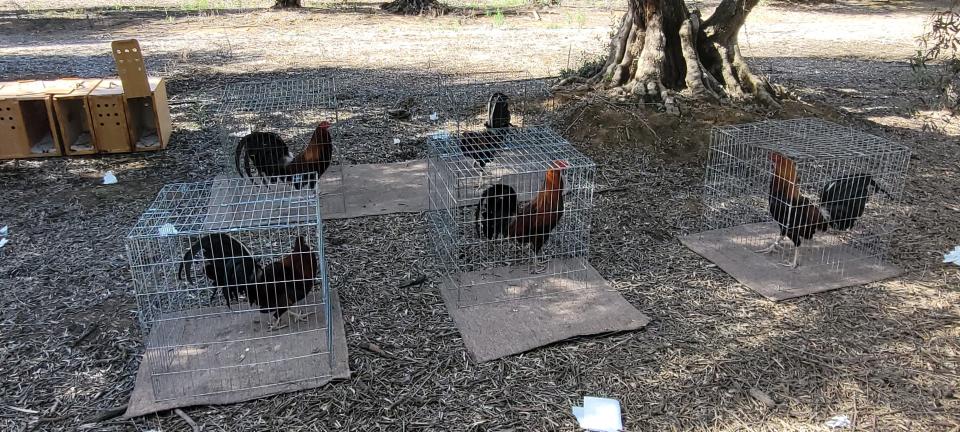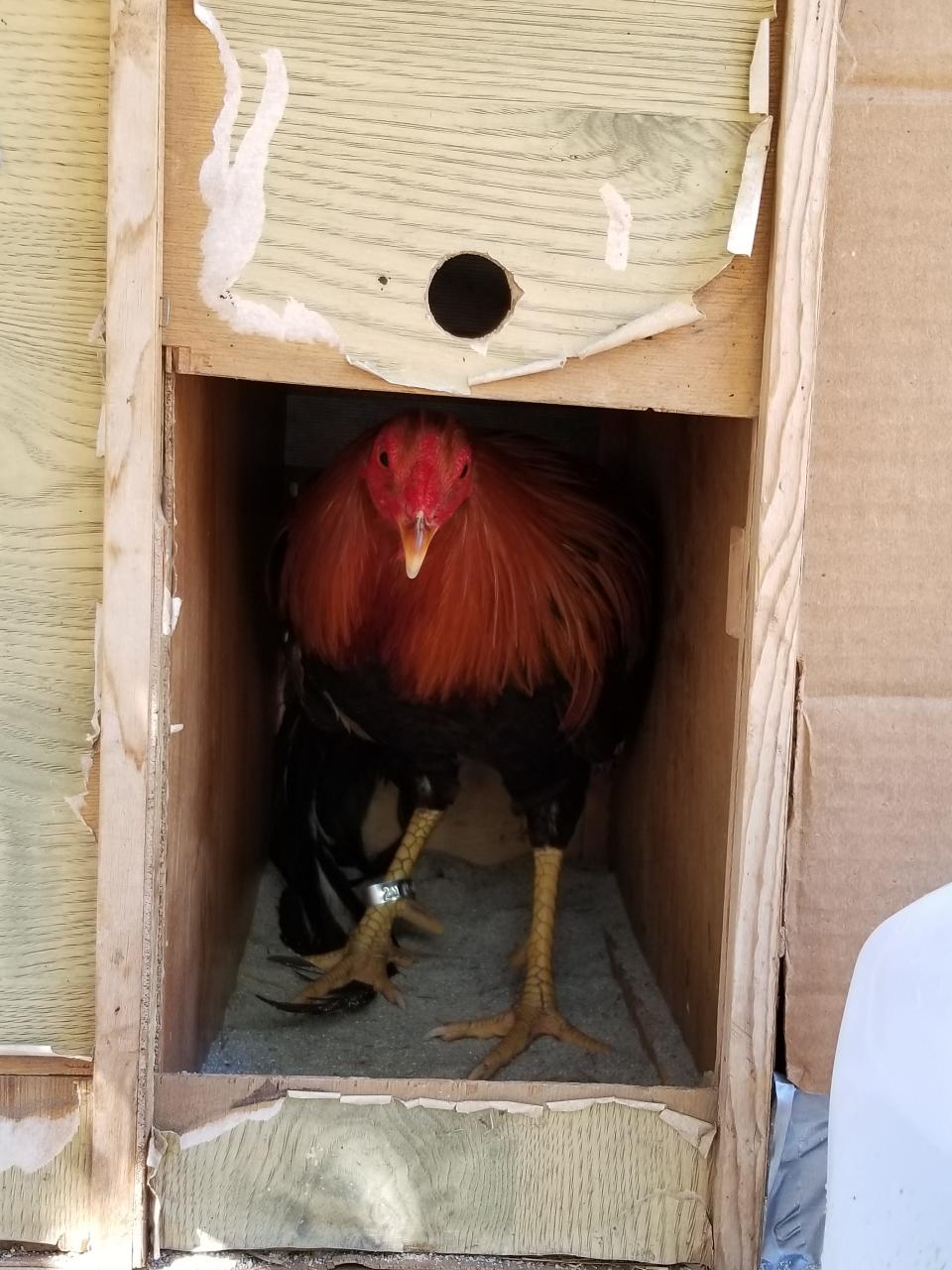'Cockfighters won' says group after Tulare County supervisors vote down ordinance
In May, nine roosters were saved from a cockfighting ring in southern Tulare County. Dozens more have been saved across the Valley thanks to deputies.
During the spring raid near Avenue 84 and Road 176 in Pixley, deputies said they noticed many cars and people huddled inside a grove. One of the suspects had 25 gaffs in his car, according to sheriff's officials. Gaffs are sharp weapons secured to roosters during a fight to make the fight more violent and bloody.
Several people were arrested.
Federal law bans cockfighting everywhere in the U.S., and most states themselves banned it within the last 100 years. California banned cockfighting in 1905 but it remains the state’s most widespread form of animal cruelty.
On Tuesday, Tulare County Board of Supervisors were asked to give county staff direction on revising or adopting a similar rooster ordinance to Ventura County. A revised ordinance would address noise and sanitation complaints and potentially curb cockfighting in the county.
Supervisors were presented with three options:
Option A: Revise the existing zoning ordinance poultry limits to limit the number of roosters.
Option B: Draft a rooster ordinance modeled after the Ventura County animal service ordinance.
Option C: Take no action.

Weighing the options
The county's current zoning ordinance was adopted in 1967 and is difficult to understand, county staff said. Supervisor Pete Vander Poel called the ordinance "overly complex" and said it provides "little very clarity" to rural residents.
Also discussed was Ventura County's ordinance, which limits the number of roosters to no more than four per parcel with few exceptions.
Commercial poultry ranches, schools, and nonprofit animal rescue facilities are exempt. Verified hobbyists and 4-H and FFA breeders may keep up to 25 roosters with no more than five of each breed. But they must comply with still-to-be-written regulations related to health and safety, parcel size, proximity to neighbors, sanitation, and animal care standards.
Besides limiting the number of roosters, the ordinance prohibits tethering of the birds. They must always be provided access to water and shelter from the elements, sufficient room to spread both wings fully and turn in a complete circle without any obstacles, and clean and sanitary premises that are kept in good repair.
"(Ventura County ordinance) is much more thorough," said Michele Washam, Resource Management Agency associate director. "There is more investigations and requirements. But it does account for exemptions for clubs and associations."
Implementing and enforcing options A or B in Tulare County would take additional staffing and resources, Washam added.
'Our hands are full'
Tulare County Animal Services "doesn't have the facility space or adequate staffing to respond to the increase requests anticipated under Options A & B," staff wrote in the report to supervisors. Currently, calls animal control staff receive fewer than 10 rooster complaints each year, staff said.
By comparison, from June to August, Tulare County Animal Services housed up to 30 dogs per day, said Rob Stewart, HHSA director of fiscal operations.
"We certainly have our hands full," Stewart said. "The number of animals we have exceeds shelter capacity."
Additionally, the costs associated with options A and B were "potentially significant," Washham said. To build a facility to house gamefowl would cost the county more than $2 million. The county still needs to hire additional staff and have recurring annual costs to run the facility.

Not another law...
Supervisors unanimously voted to take no action, citing several concerns.
The main concern shared by supervisors and staff was the lack of staffing and resources needed for options A and B.
"We don't have the adequate resources to deal with what we have now," Supervisor Amy Shuklian said. "...We don't need to tell people how many roosters they can have on their property."
Supervisor Eddie Valero also said the options presented would be difficult to enforce, and the costs associated with both options didn't "pass the giggle test."
He didn't elaborate on what that test includes.
Vander Poel and Supervisor Larry Micari were open to updating the zoning language of the current ordinance, which the county's Resource Management Agency will explore.
"There are a lot of laws in place to restrict this illegal activity that takes place in our community," Vander Poel said. "I don't think we need to add another law to the books."

'What's next?'
Several local gamefowl enthusiasts spoke against changing or adopting a revised ordinance.
Orville Evans lives in Terra Bella, where he raises gamefowl that he sends overseas. He opposed revising the rooster ordinance as specified in options A and B. He didn't say how the roosters are used once they leave the U.S.
"It's very unconstitutional for people to tell me that I can't do what I want on my property," he said. "We're blessed to live in a free country."
Already though, there are laws on the books that limit the numbers of dogs and cats that residents can have.
Craig Ainley also shared his concerns about a revised ordinance to protect roosters from fighting. Ainley serves as board president for the California Association for the Preservation of Gamefowl.
"This is a slippery slope," Ainley said. "What's next?"
Some spoke out in favor of a revised ordinance.
Following the board's decision, Animal Wellness Action officials stated in a press release that they felt "deep disappointment" in the Tulare County Board of Supervisors for failing to take a proactive approach to curb cockfighting in the county.
The Washington, D.C.-based nonprofit presented detailed evidence about cockfighting in Tulare County, its connection to a range of crimes, and its threat to legitimate agricultural operations. Cockfighting in the county has been an issue for years and has been directly linked to cartels, gangs and drug operations that litter rural Tulare County.
“Many major agricultural counties in California adopted a limitation on private ownership of roosters, with appropriate exemptions for legitimate agricultural operations,” said Wayne Pacelle, president of Animal Wellness Action.
Ventura and Monterey counties, both with more progressive populations, approved ordinance to curb cockfighting.
Animal Wellness Action representatives also argued that the projected costs presented by Tulare County RMA were "off the wall." They went on to say that counties like Ventura have self-abatement programs, which don't require the county to house roosters.
Counties have adopted these types of rooster ordinances because of cockfighters and wanted to stop other crimes associated with cockfighting and the spread of deadly avian diseases, according to Pacelle. Animal Wellness Action says they have investigated illegal cockfighting operations in the county and documented dozens of major gamecock operations.
"Sadly, the board of supervisors did not see through the masquerade presented at the hearing," he said. "It was cockfighters, not legitimate animal owners, who won the day in Tulare County today.”
This article originally appeared on Visalia Times-Delta: 'Cockfighters won' says group after Tulare County supervisors vote no

